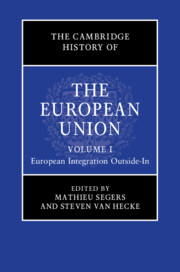Book contents
- The Cambridge History of the European Union
- The Cambridge History of the European Union
- The Cambridge History of the European Union
- Copyright page
- Contents
- Figures
- Contributors to Volume I
- Acknowledgements
- Abbreviations
- Reflections on the History and Historiography of European Integration
- Part I Critical Junctures
- Part II Multilateralism and Geopolitics
- Part III Perspectives and Ideas
- Networks and Attitudes
- Thinking and Memory
- Culture and Religion
- 24 European Culture(s)
- 25 The Catholic Narrative of European Integration
- 26 European Integration and the Churches
- Index
- References
26 - European Integration and the Churches
from Culture and Religion
Published online by Cambridge University Press: 21 October 2023
- The Cambridge History of the European Union
- The Cambridge History of the European Union
- The Cambridge History of the European Union
- Copyright page
- Contents
- Figures
- Contributors to Volume I
- Acknowledgements
- Abbreviations
- Reflections on the History and Historiography of European Integration
- Part I Critical Junctures
- Part II Multilateralism and Geopolitics
- Part III Perspectives and Ideas
- Networks and Attitudes
- Thinking and Memory
- Culture and Religion
- 24 European Culture(s)
- 25 The Catholic Narrative of European Integration
- 26 European Integration and the Churches
- Index
- References
Summary
The principal theories of European integration (neo-functionalism, intergovernmentalism and social constructivism) have been rather silent about the presence and role of the religious factor in the process of unification of Europe. Such an approach, based on a certain underestimation of religion, seems to be unjustifiable nowadays, since it has become evident that the religious component of European integration appears in various forms and formats. For instance, some Protestants regard this integration as a religious ‘plot’, usually of the Roman Catholic Church, aiming at the construction of a new European Catholic empire and the undermining of Protestantism. Also, the religious dimension was one of the most controversial and fiercely debated issues at the time of drafting the European Constitution, namely the inclusion in the text of the reference to the Christian inheritance of Europe, or the reference to God. The religious or religion-related arguments played an important role in the debates on the EU membership of the largest ‘newcomer’ of the 2004 enlargement (Poland), and in the discussion in Ireland on the referendums on the Lisbon Treaty in 2008 and 2009. Finally, the importance of religion has been confirmed in the referendums on EU membership, including the 2016 ‘Brexit’ referendum in the United Kingdom.
It is therefore pertinent to claim that the presence of religion, or, to be more precise, Christian Churches, in the process of European integration is not disputable; we can only discuss how this presence has been seen, analysed and interpreted. This is addressed in chapter 26, in accordance with the following structure. First I discuss how the role of Churches in European integration has been described in the relevant literature. Then I analyse the role of Churches at the beginning of integration, in terms of their role as non-state actors and identity formers, as well as the Churches’ influence and their presence at supranational level. The final pages of this chapter have been devoted to the discussion of the practical cooperation of the Churches and EU institutions.
- Type
- Chapter
- Information
- The Cambridge History of the European Union , pp. 659 - 682Publisher: Cambridge University PressPrint publication year: 2023

